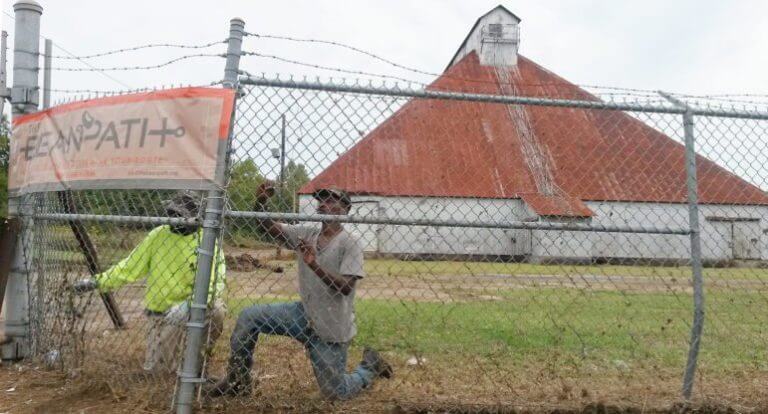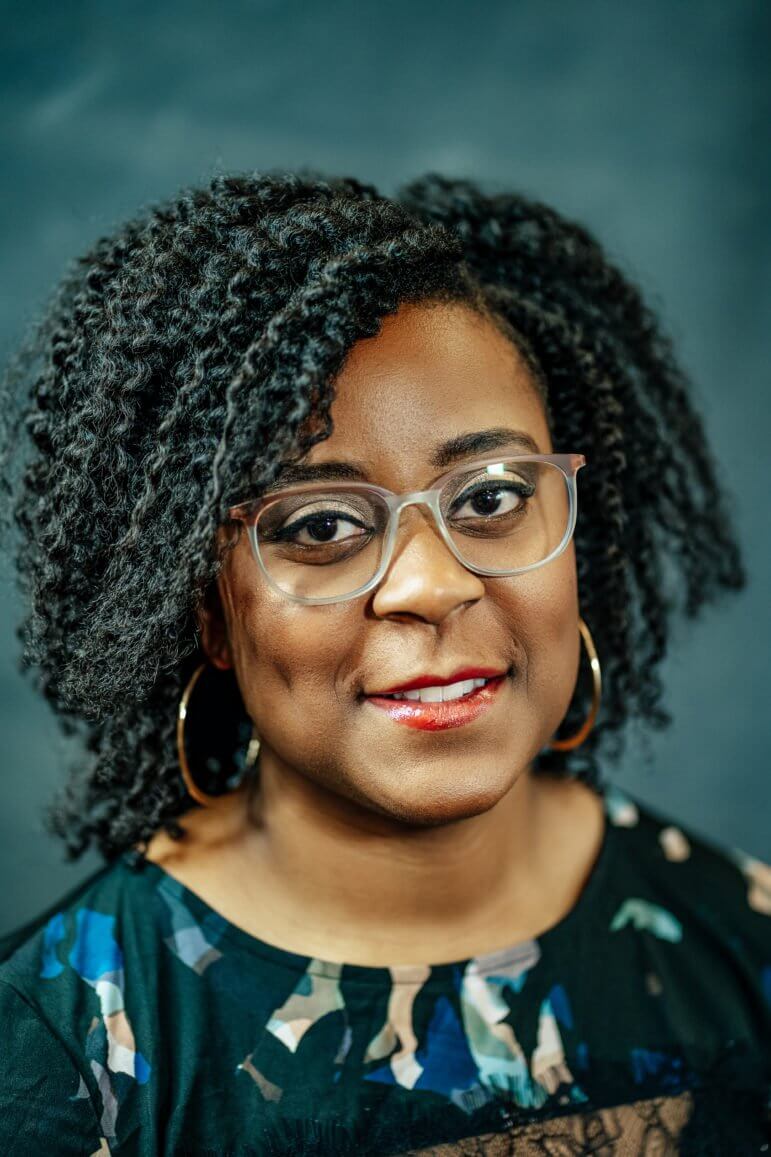

Vickie D. King/Mississippi Today
Landscapers Charles Harvey (left) and Louis Charleston, both with Big Oak Lawn Maintenance, remove vines and other debris from an abandoned Gallatin Street property in Jackson. The property will be renovated into a WiFi hotspot/event space and part of a new development, The Jackson Tech District.
Jackson native disrupts downtown with new tech hub plans
How fighting discrimination in artificial intelligence informed ideas to foster tech access
By Erica Hensley | October 10, 2020
Driving through the edges of downtown Jackson as a kid, Nashlie Sephus was fascinated with a particular abandoned factory warehouse she called “the barn.”
The barn is still stark in size and stature, towering over a major thoroughfare that’s more highly trafficked than nearly every other street in the city, but has suffered from decades of divestment despite being flanked by Jackson State University and the city’s business district. Dissected by the state’s main railroad corridor that houses Jackson’s Amtrak station and Town Creek that winds through downtown to feed the Pearl River, Sephus says North Gallatin Street is the perfect spot for the city to re-envision its future and to invest in her home.
But until recently, the property sat abandoned like much of the street and surrounding area. Sephus, 35, bought it in September along with 12 accompanying acres to create what she’s dubbed the “Jackson Tech District” — a block of now-unused industrial property she’s morphing into a technology district, mixing non- and for-profit space to create a resource, playground and potential development anchor for the community.
“I believe in all the benefits of having come from a place like Jackson and being born in Mississippi. There’s not a person who knows me who doesn’t know that I’m from Mississippi and I love to brag on it and help change people’s stereotypes,” she said. Having lived on both coasts and worked with people all over the world in the tech industry, “I like to put that front and center.”

Sephus has dedicated her career to technology equity. A Mississippi State University graduate in computer engineering, she now works for Amazon reconfiguring data patterns that show implicit bias. She also launched a non-profit in Jackson two years ago called The Bean Path, dedicated to helping everyone from children to small business owners access tech tools they need through coding and engineering programing, “tech hours” at local libraries and grant-making to encourage STEM growth in schools.
The Bean Path will own and operate arts and culture programming, tech classes and events in two of the seven buildings across the tech hub’s new district. Mixed-use development comprising housing, offices, restaurants and collaborative work spaces are planned for the other buildings, all revolving around the idea of leveling the playing field with dedicated space for and open access to tech tools.
“This (technology) is such a huge infrastructure and a part of our daily lives, it’s very important for us to keep up and not be left behind,” she said. “I think it’s really important for me to make sure I’m doing everything I can, being that I’m an expert in this industry, to make sure that other people like me have opportunities to be successful in this field and also to bridge the gap to help people with their everyday lives.”
In Jackson, classes are still virtual but resources are scarce and COVID-19 emotional and physical tolls are high, exacerbated by longstanding housing and health inequities. “(We were) thinking about kids that may need somewhere to access the internet, they need to rent laptops for a day and access a tutor, because not all parents are about that tutoring life,” Sephus said.
-
Landscapers Charles Harvey (left) and Louis Charleston, both with Big Oak Lawn Maintenance, remove vines and other debris from an abandoned Gallatin Street property in Jackson. The property will be renovated into a WiFi hotspot/event space called, The Jackson Tech District. -
Designs for the same property as part of Jackson Tech District / rendering by Sophia Parker with Dragonfly Design Center
She added this type of strategic community planning and investment in the community has traditionally been missing from big Jackson development projects. “We can provide them a space for them to come, this belongs to the community just as much as it belongs to me. I want to make everybody a part of that, I think engaging the community is one of the biggest pieces that might be missing from that downtown area.”
As a computer engineer focused on machine learning, she looks for patterns and, often more importantly, diversions from those patterns to help artificial intelligence course-correct for bias. For AI, patterns determine everything, like the types of ads you see on social media, what kind of music and TV shows streaming services suggest for you and which routes self-driving cars pick.
But patterns meant to teach AI can also be deceiving and discriminatory if they only reflect certain groups — and it all revolves around what dataset the tech pulls from. Research shows facial recognition software works best for white men and misidentifies Black faces more often.
For AI to recognize and learn from situations, it uses information from previous datasets — when it encounters something new, the bias defaults to reject or mis-categorize it unless it fits in with pre-existing patterns. AI can be biased because the information it has to learn from is biased, particularly when it comes to race, gender and social inequity.
Sephus works on Amazon Web Services’ AI team to detect inequities in algorithms and retrain them to discern differences. Essentially, her team works to identify and recalibrate fairness within data patterns, such as facial recognition and how bank loans are awarded.
“Anything outside of those patterns shows up as an anomaly and so we’re looking at things to detect faces, even to detect my voice. If you haven’t ‘trained your algorithm’ on voices of people from the South, it probably won’t work as well for people who sound like us,” she said.
Sephus experienced the bias inherent to bank loan algorithms firsthand over the last 18 months when she fought for, and was ultimately denied, financing to buy up the now-abandoned property in downtown Jackson that she plans to develop into the tech hub.
“For me having come from Amazon, I had a startup successful acquisition, I have access to a lot of capital, a lot of it is my own — I just realized sometimes it doesn’t matter how much money you have. The banks don’t care, they’re looking for certain trends and patterns,” she said.
It took the then-landowner agreeing to owner financing and Ridgeland-based Butler Snow law firm committing to pro-bono representation to close the deal, she says. A year and half after deciding to make the tech hub reality, Sephus is breaking ground on the new project. She says it stands to not only revolutionize the community and its capital, but also transform Jackson’s infrastructure and development to be from a community, rather than just for it — issues the nearby Farish Street has been plagued with.
“I am a fairly young person, I’m a Black female. I don’t know many other people who look like me who are similar to me, who own property and are doing the same thing in the downtown area,” she said. “I think that’s kind of what it takes — for somebody who thinks differently with a different background to come in and, as we say in the start-up world, disrupt … I’m crazy enough to believe that we can pull this off.”
She lives and works in Atlanta, but is spending a lot of time home in Jackson to get the project going and funded, and is not new to homegrown non-profit work, like The Bean Path that will spearhead community programming for the new tech district. She says she hopes more infrastructure recognizes that tech equity is more than just the biases in technology itself, but access to it, like universal high speed internet access.

She sees the tech hub as an inflection point for the area that will not only bring economic development and impact for kids who benefit from the tech resources, but with classes, trainings and tutoring she thinks it will bring workforce skills development for people going to work within the tech industry, and increase the area’s property value and infrastructure along the way. One of her more-pressing goals is to turn the barn event space into a safe WiFi hotspot for students’ virtual learning needs.
“Especially given the things that have happened this year in terms of COVID, in terms of the Black Lives Matter movement, I think the time is now,” she said. “I just want people to understand that it shouldn’t be this hard and that I am dedicated to making sure that I bring the community along in this process and educating them on how I’m going about it and how they can also do the same thing … you can do it. Get a good support system. I definitely have more than my fair share of people that are supporting me, and that I attribute my success to. I want to be that person for the next generation.”
Editor’s note: Tray Hairston, a member of Mississippi Today’s board of directors, is the Butler Snow attorney who worked with Sephus for the tech hub property closing.
The post Jackson native disrupts downtown with new tech hub plans appeared first on Mississippi Today.
- Mississippi Marketplace: data center ups and downs, alcohol shortages and new manufacturing projects - February 19, 2026
- More Mississippi students are graduating despite pandemic-era disruptions, new data shows - February 19, 2026
- Education advocates says Mississippi needs honest, nuanced school choice discussion - February 19, 2026

